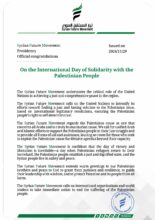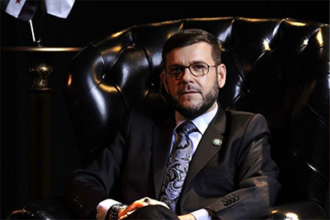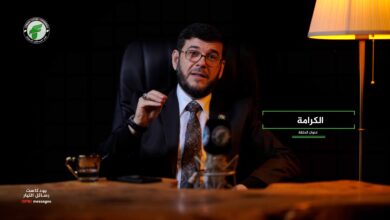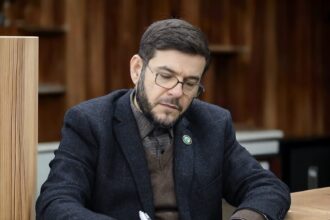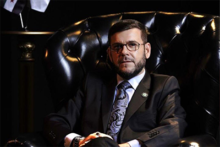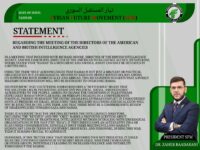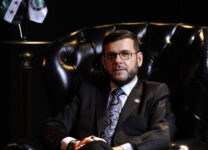Our Position on the Constitutional Committee
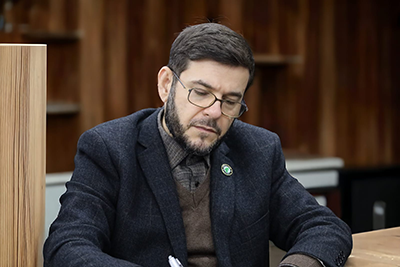
On Sunday, March 17, 2024, Geir Pedersen issued an invitation to the Syrian regime to head to Geneva to participate in the Constitutional Committee meeting at the end of next April, where he stated: “I fear that I have nothing new to tell you in this regard. The situation in Syria is currently very difficult, and I believe all indicators are pointing in the wrong direction, whether it concerns security, economy, or the political process.”
In light of these pessimistic statements, we can express our position on both the Constitutional Committee and the Negotiation Body!
Negotiation Body and Constitutional Committee:
The High Negotiations Committee (HNC) of the Syrian opposition was established on December 10, 2015, during a meeting held by the Syrian opposition factions in Riyadh, agreeing on its composition to include 32 members, among them nine from the National Coalition for Syrian Revolutionary and Opposition Forces, ten from the armed factions, five from the National Coordination Committee, and eight independents. The presidency of the committee has rotated among several opposition figures, notably its first president, Mr. Riad Hijab.
At the “Riyadh 2” conference, held on November 22 and 23, 2017, the Syrian opposition chose the members of the new version of the “Body,” known as “Negotiation Body 2,” which included a total of 50 members.
The body consisted of representatives from the National Coalition, the National Coordination Body, Moscow and Cairo platforms, in addition to independents and representatives of military factions.
The process involves selecting the head of the Negotiation Body and the deputy through meetings held among the body members. In the “Riyadh 2” conference held in November 2017, Mr. Nasr al-Hariri was chosen to lead the body. The selection of the president and deputy president is based on the collective decisions made by the body members.
Mr. Nasr al-Hariri, the head of the Syrian High Negotiations Committee, announced the end of his mandate as head of the body on June 12, 2020, due to the internal regulations of the body not allowing for a third term candidacy.
After Hariri’s term ended, on June 13, 2020, Mr. Anas al-Abdah was elected.
Two years into al-Abdah’s term, the first meeting of the Syrian Negotiation Body inside Syrian territory was held in the city of Al-Rai near the Turkish border in July 2022. During this meeting, Badr Jamous was elected as the new head of the body, to be re-elected in August of the previous year, 2023.
Constitutional Committee:
The decision to form the Constitutional Committee was made as part of the outcomes of the “Syrian National Dialogue Conference,” held in the Russian city of Sochi on January 30 and 31, 2018, under the auspices of the guarantor states, Turkey, Russia, and Iran.
This came after the Constitutional Committee was proposed in Geneva, where its formation was preceded by several technical sessions held in Geneva and Lausanne. After the international envoy at the time, “Demistura,” requested the formation of the Constitutional Committee in Geneva, both the Russians and the Syrian regime refused this! They worked on the National Dialogue Conference, where the Constitutional Committee was then approved.
After more than a year and a half of consultations, the UN Secretary-General, “Antonio Guterres,” announced on September 23, 2019, the formation of the “Constitutional Committee,” as part of the efforts to end the crisis in Syria.
On November 4, 2019, the committee held its first meeting in Geneva to define the agenda, where the meetings witnessed disagreements and a breach of the code of conduct regulating the meetings.
Order of Business:
In the Syrian Future Movement, we have distanced ourselves from being a party in both the Negotiation Body and the Constitutional Committee (although we could have), and we closely monitor everything that happens, for reasons including:
1- Our initial fear of those in the Negotiation Body considering themselves as sharing a power in itself, making it a spoils among them.
2- The presence of groups in the Negotiation Body with differing views on the overthrow of Assad, interpreting UN resolution 2254 differently, not to mention the entrenched disagreements between the body’s components, as well as the diversity of members’ perspectives and their differing alliances according to the countries involved in the Syrian conflict.
3- Our view that all efforts are linked to an international seal, in preparation for imposing an agreement larger than the Syrian parties themselves, regime and opposition, then came the stalling of their meeting for about two years after the last meeting, clearly demonstrating this!
4- The absence of any registered objections by the negotiating body throughout the entire previous stage against the international envoy’s negligence and his time consumption without achieving any significant progress! It was imperative to put him and the endorsing entities, who are keen on his persona, under pressure that would lead to his replacement or to pointing the finger of blame at him and the party responsible for the deadlock in the work of the Constitutional Committee and its sessions.
On March 10th of this month, the “Syrian Negotiation Commission” consented to dispatch its representatives to participate in the ninth round of the Constitutional Committee meetings scheduled for April, in response to the invitation of the UN Special Envoy to Syria, “Geir Pedersen.”
This was declared in a concluding statement by the negotiation commission after two days of meetings in Istanbul, where the commission was briefed on a comprehensive political overview by its chairman, Mr. Badr Jamous, and reviewed its committees’ reports and discussed the overall political situation.
Position of the Syrian Future Movement (SFM):
Firstly, we summarize our observations as follows:
1- Criticisms on the performance of the Syrian Negotiation Commission, especially concerning its composition, which we find to be a mix of divergent elements!
2- The commission’s and the Constitutional Committee’s reliance on external green or red lights, significantly and directly tied to the Russian side, and to the Turkish side, depending on mood swings. Assuming, hypothetically, there was a deal between the Americans and Russians after the (Kerry/Lavrov) agreement, we believe that the Russian stance after the Ukraine war has diminished its capability to convince the international community of its views, hence, the prospects for Constitutional Committee negotiations are nearly non-existent at the closest estimate.
3- The necessity for Syrian opposition institutions to be represented in the Constitutional Committee. In the Syrian Future Movement, we reject calls for the opposition to resign from its political obligations, and we view its presence in the Committee as positive. Additionally, we believe the Negotiation Commission still has much to accomplish and remains capable of navigating through to create an advantageous environment, especially after the tsunami of the Al-Aqsa flood and its rebound waves (if we skillfully ride the waves and establish a balance that eludes the great powers).
4- The Negotiation Commission attempts to achieve a “confluence” to maintain the support of the Turkish ally, amid a freeze in communication with Arab states.
It is crucial to express our support for the body’s components that united over the nation’s interest and the implementation of UN resolutions via the four baskets proposed for discussion with the Syrian regime: (transitional governance, constitution, elections, and counter-terrorism).
We stress the importance of reaching a political resolution that meets our people’s aspirations, guided by the following principles:
1- Emphasizing the establishment of a transitional governance body and not compromising on that demand.
2- Prohibiting any form of delay by either the Syrian regime or the international envoy, even if it necessitates requesting his removal and replacement.
3- Implementing a timeline that both parties must follow.
4- Establishing a timeline for the remaining baskets.
5- Focusing on confidence-building issues, such as the detainees and forcibly disappeared individuals case.
In conclusion:
The Syrian Future Movement closely monitors the endeavors of both the Syrian Negotiation Commission and the Constitutional Committee, affirming that when we perceive both paths as national routes toward a comprehensive and sustainable resolution, we will not merely express our gratitude! Instead, we will engage in the process and share the national and historical responsibility with others as dictated by the circumstances and event developments.
Dr. Zaher Ihssan Baadarani
Presidency office
Article
Syrian Future Movement (SFM)
